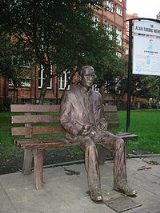
Alan Turing
Alan Turing was a British mathematician and cryptographer who is considered to be one of the fathers of modern computer science.
Sourced
- Mathematical reasoning may be regarded rather schematically as the exercise of a combination of two facilities, which we may call intuition and ingenuity. The activity of the intuition consists in making spontaneous judgements which are not the result of conscious trains of reasoning... The exercise of ingenuity in mathematics consists in aiding the intuition through suitable arrangements of propositions, and perhaps geometrical figures or drawings.
- "Systems of Logic Based on Ordinals," section 11: The purpose of ordinal logics (1938), published in Proceedings of the London Mathematical Society, series 2, vol. 45 (1939)
- In a footnote to the first sentence, Turing added: "We are leaving out of account that most important faculty which distinguishes topics of interest from others; in fact, we are regarding the function of the mathematician as simply to determine the truth or falsity of propositions."
- Instruction tables will have to be made up by mathematicians with computing experience and perhaps a certain puzzle-solving ability. There need be no real danger of it ever becoming a drudge, for any processes that are quite mechanical may be turned over to the machine itself.
- "Proposed Electronic Calculator" (1946), a report for National Physical Laboratory, Teddington; published in A. M. Turing's ACE Report of 1946 and Other Papers (1986), edited by B. E. Carpenter and R. W. Doran, and in The Collected Works of A. M. Turing (1992), edited by D. C. Ince, Vol. 3
- A man provided with paper, pencil, and rubber, and subject to strict discipline, is in effect a universal machine.
- "Intelligent Machinery: A Report by A. M. Turing," (Summer 1948), submitted to the National Physical Laboratory (1948) and published in Key Papers: Cybernetics, ed. C. R. Evans and A. D. J. Robertson (1968) and, in variant form, in Machine Intelligence 5, ed. B. Meltzer and D. Michie (1969)
- Science is a differential equation. Religion is a boundary condition.
- Letter to Robin Gandy, 1954; reprinted in Andrew Hodges, Alan Turing: the Enigma (Vintage edition 1992), p. 513
Computing Machinery and Intelligence (1950)
- Published in Mind, vol. 59, #236 (1950). This paper describes what has come to be known as the Turing Test. At the time it was written, the term "computer" was a job title describing an individual who processed figures by hand. - Full text online
- The idea behind digital computers may be explained by saying that these machines are intended to carry out any operations which could be done by a human computer.
- p. 436
- I believe that at the end of the century the use of words and general educated opinion will have altered so much that one will be able to speak of machines thinking without expecting to be contradicted.
- p. 442
- I am not very impressed with theological arguments whatever they may be used to support. Such arguments have often been found unsatisfactory in the past. In the time of Galileo it was argued that the texts, "And the sun stood still... and hasted not to go down about a whole day" (Joshua x. 13) and "He laid the foundations of the earth, that it should not move at any time" (Psalm cv. 5) were an adequate refutation of the Copernican theory.
- pp. 443-444
- We can only see a short distance ahead, but we can see plenty there that needs to be done.
- p. 460
Quotes about Turing
- His high-pitched voice already stood out above the general murmur of well-behaved junior executives grooming themselves for promotion within the Bell corporation. Then he was suddenly heard to say: "No, I'm not interested in developing a powerful brain. All I'm after is just a mediocre brain, something like the President of the American Telephone and Telegraph Company."
- Andrew Hodges, Alan Turing: the Enigma of Intelligence (1983), p. 251.
- Describing an incident which occurred in the New York AT & T lab cafeteria in 1943
- Although a mathematician, Turing took quite an interest in the engineering side of computer design. There was some discussion in 1947 as to whether a cheaper substance than mercury could not be found for use as an ultrasonic delay medium. Turing's contribution to this discussion was to advocate the use of gin, which he said contained alcohol and water in just the right proportions to give a zero temperature coefficient of propagation velocity at room temperature.
- Maurice V. Wilkes, "Computers Then and Now", Journal of the ACM 15 (1), (January 1968), pp. 1-7
- Turing had a strong predeliction for working things out from first principles, usually in the first instance without consulting any previous work on the subject, and no doubt it was this habit which gave his work that characteristically original flavor. I was reminded of a remark which Beethoven is reputed to have made when he was asked if he had heard a certain work of Mozart which was attracting much attention. He replied that he had not, and added "neither shall I do so, lest I forfeit some of my own originality."
- James H. Wilkinson, "Some Comments from a Numerical Analyst", 1970 Turing Award lecture, Journal of the ACM 18:2 (February 1971), pp. 137–147
- He was particularly fond of little programming tricks (some people would say that he was too fond of them to be a "good" programmer) and would chuckle with boyish good humor at any little tricks I may have used.
- James H. Wilkinson, "Some Comments from a Numerical Analyst", 1970 Turing Award lecture, Journal of the ACM 18:2 (February 1971), pp. 137–147
